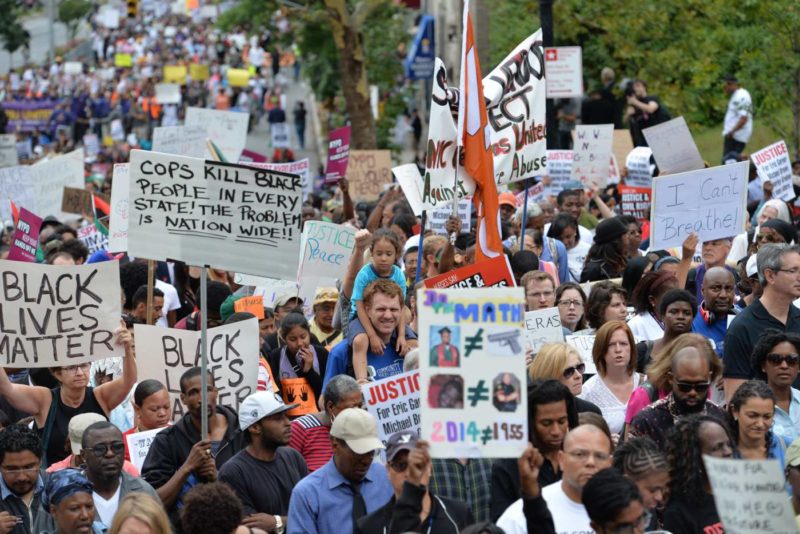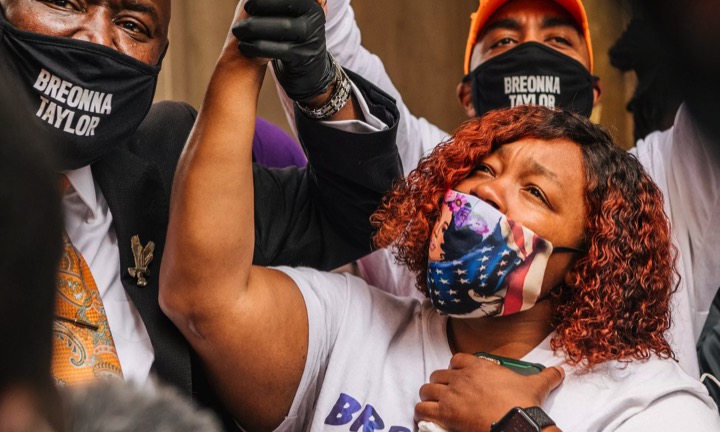Special News Series: Rising Up For Justice! – The policing reforms in the Breonna Taylor settlement, explained
Share
Explore Our Galleries
Breaking News!
Today's news and culture by Black and other reporters in the Black and mainstream media.
Ways to Support ABHM?
Introduction To This Series:
This post is one installment in an ongoing news series: a “living history” of the current national and international uprising for justice.
Today’s movement descends directly from the many earlier civil rights struggles against repeated injustices and race-based violence, including the killing of unarmed Black people. The posts in this series serve as a timeline of the uprising that began on May 26, 2020, the day after a Minneapolis police officer killed an unarmed Black man, George Floyd, by kneeling on his neck. The viral video of Floyd’s torturous suffocation brought unprecedented national awareness to the ongoing demand to truly make Black Lives Matter in this country.
The posts in this series focus on stories of the particular killings that have spurred the current uprising and on the protests taking place around the USA and across the globe. Sadly, thousands of people have lost their lives to systemic racial, gender, sexuality, judicial, and economic injustice. The few whose names are listed here represent the countless others lost before and since. Likewise, we can report but a few of the countless demonstrations for justice now taking place in our major cities, small towns, and suburbs.

To view the entire series of Rising Up for Justice! posts, insert “rising up” in the search bar above.
The policing reforms in the Breonna Taylor settlement, explained
By Fabiola Cineas, Vox
September 17, 2020
From revised search warrant protocols to contracting social workers, the policy changes are a start but could go much further.

A $12 million payout certainly won’t bring Breonna Taylor back. But the city of Louisville’s historic settlement with her family also includes a set of police reforms that may —depending on how and if they are implemented— help prevent police killings like the one that ended Taylor’s life in March.
The set of reforms, announced as part of the family’s civil suit on Tuesday, addresses three areas of policing in Louisville: community connections between police and the people they serve; search warrant protocol; and police accountability. For example, the reforms encourage officers to increase their casual presence in certain communities and include social workers in their dispatch runs. Altogether, the reforms represent an opportunity to move the city forward but remain far from activist calls to defund or abolish the police…
Community relations measures are encouraged but not mandatory
To improve the relationship between police and the people of Louisville, Fischer announced a plan to create a housing credit program to incentivize officers to live within “Qualified Census Tracts,” areas identified by the Department of Housing and Urban Development as having a poverty rate of 25 percent or more or where 50 percent of households have incomes below 60 percent of the area median gross income. The city plans to build on models already underway in cities like Chicago, Atlanta, and Washington, DC…
Social workers will assist police — but won’t replace them
In a proposal that meets activists in the middle, Fischer announced that the department will retain social workers to support and assist officers on dispatch runs. The developing program will be funded through forfeiture funds and will contract social workers.
The proposal addresses some of the conversation coming out of the defund movement, which is forcing leaders to think deeply about when to dispatch police — and when not to…
Changes made to the search warrant protocol that could have saved Breonna Taylor’s life
Taylor’s killing has raised public attention about no-knock warrants and about search warrants in general. Taylor was shot eight times in her home after three officers used a battering ram to enter it under the authority of a no-knock warrant. Since then, the Louisville Metro Council unanimously voted to pass “Breonna’s Law,” an ordinance that bans the use of no-knock warrants.
The settlement’s stated reforms make three additional changes to standard operating procedure around warrants. First, a commanding officer must review and approve all search warrants before an officer seeks judicial approval for the warrant, in an attempt to calculate and assess risk. Second, the department plans to overhaul the process and chain of command for simultaneous search warrants.
These may work to address the problematic search warrant procedures that took place in Taylor’s case. The family’s lawsuit alleged that police were looking for a drug dealer and had the wrong information about his address. Police also reportedly mistook Taylor’s car, which was parked outside her apartment that night, as the drug dealer’s car, according to the lawsuit. An extra review of the warrant by a commanding officer could have assessed the risk associated with acting on information that was reportedly wrong and outdated. Fischer stressed that these updates, together with Breonna’s Law, are “substantial” and create a new level of scrutiny for obtaining search warrants.
Third, the department now requires that EMS and/or paramedics be at the scene where forced entry warrants are used.
Read the full article here.
More Breaking News here.
More about Breonna Taylor’s killing here.









Comments Are Welcome
Note: We moderate submissions in order to create a space for meaningful dialogue, a space where museum visitors – adults and youth –– can exchange informed, thoughtful, and relevant comments that add value to our exhibits.
Racial slurs, personal attacks, obscenity, profanity, and SHOUTING do not meet the above standard. Such comments are posted in the exhibit Hateful Speech. Commercial promotions, impersonations, and incoherent comments likewise fail to meet our goals, so will not be posted. Submissions longer than 120 words will be shortened.
See our full Comments Policy here.